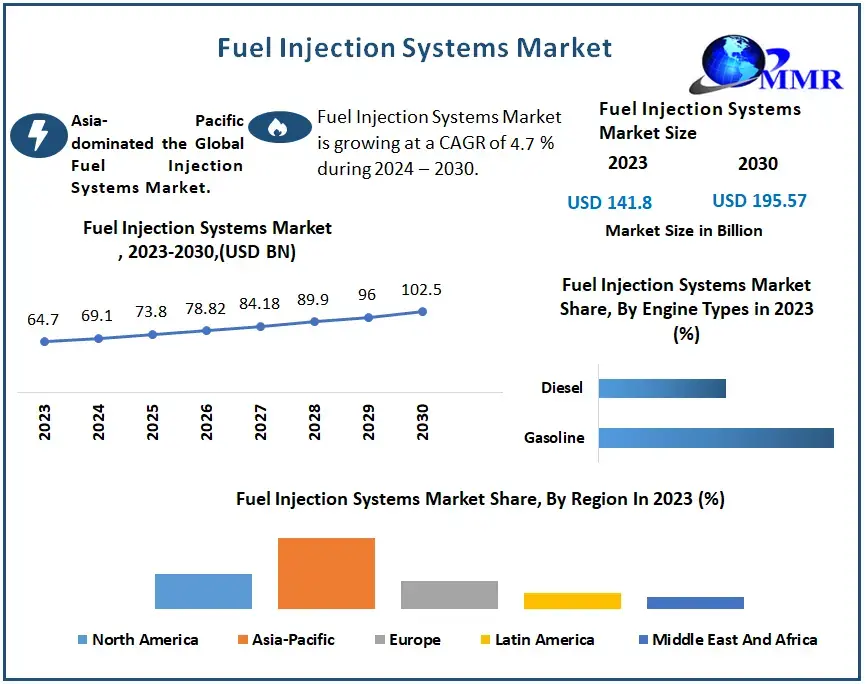The Future of Fuel Injection Systems: Market Size, Share, and Trends 2024-2030

Introduction
The Fuel Injection Systems Market is undergoing a transformation, driven by advancements in automotive technology, stricter emission regulations, and the growing demand for fuel efficiency. As internal combustion engines (ICEs) continue to evolve and alternative fuels gain traction, fuel injection systems remain a critical component in modern vehicles. This blog explores the key trends, market segmentation, top players, and industry insights shaping the future of the fuel injection systems market.
Request Links
For an in-depth market analysis and exclusive insights, Request your free sample report here.
Market Overview and Growth Trends
The global fuel injection systems market is projected to grow at a steady rate, with a CAGR of X% from 2024 to 2030. The market’s expansion is fueled by:
-
Stringent Emission Regulations – Governments worldwide are enforcing policies to reduce carbon emissions, driving the need for advanced fuel injection systems.
-
Rising Demand for Fuel Efficiency – Consumers and manufacturers seek fuel-efficient vehicles to optimize performance and cost-effectiveness.
-
Advancements in Technology – The integration of electronic fuel injection (EFI) and direct injection systems enhances engine efficiency and power output.
-
Growth of Hybrid and Alternative Fuel Vehicles – As the transition to hybrid and biofuel-powered vehicles gains momentum, fuel injection systems must adapt to new fuel compositions.
Market Segmentation
The fuel injection systems market is segmented based on various factors, including type, vehicle type, technology, and region.
By Type
-
Port Fuel Injection (PFI) – Commonly used in gasoline engines for smooth performance.
-
Direct Fuel Injection (DI) – Offers better fuel efficiency and power, mainly found in modern vehicles.
-
Throttle Body Injection (TBI) – A cost-effective alternative for older vehicle models.
By Vehicle Type
-
Passenger Cars – The largest segment due to increasing automobile production.
-
Commercial Vehicles – Demand for heavy-duty and light-duty commercial vehicles continues to rise.
-
Two-Wheelers – Growth in emerging economies fuels demand for motorcycles with advanced injection systems.
By Technology
-
Electronic Fuel Injection (EFI) – Dominates the market due to superior efficiency and precision.
-
Mechanical Fuel Injection – Used in older vehicle models but gradually being replaced by EFI.
By Region
-
North America – Growth driven by stringent emission norms and tech advancements.
-
Europe – Leading in innovation, with a strong focus on sustainability.
-
Asia-Pacific – Fastest-growing market due to high vehicle production in China and India.
-
Middle East & Africa – Expansion due to rising demand for commercial and heavy-duty vehicles.
Key Players in the Fuel Injection Systems Market
Several major players dominate the fuel injection systems industry, continuously innovating to stay ahead. Leading companies include:
-
Bosch – A global leader in automotive technology, providing cutting-edge fuel injection solutions.
-
Delphi Technologies – Specializes in high-performance fuel injection systems.
-
Denso Corporation – Known for its advanced electronic fuel injection solutions.
-
Continental AG – Focuses on sustainable and fuel-efficient injection technologies.
-
Magneti Marelli – Develops innovative fuel injection systems for multiple vehicle types.
Insights and Industry Developments
-
Shift Towards Electric Vehicles (EVs): While fuel injection systems remain crucial for ICEs, the rise of EVs presents challenges. However, hybrid vehicles still require sophisticated fuel injection systems, ensuring steady market demand.
-
Integration of IoT and AI: Smart fuel injection systems use real-time data and AI-driven analytics to optimize fuel efficiency and reduce emissions.
-
Emergence of Alternative Fuels: Biofuels, hydrogen, and synthetic fuels are pushing manufacturers to develop adaptive fuel injection technologies.
-
Aftermarket Growth: The demand for aftermarket fuel injection components is increasing, particularly in regions with a high number of aging vehicles.
Request More Insights
Gain a deeper understanding of market opportunities and challenges. Request our detailed report here.
Conclusion
The fuel injection systems market is at a pivotal point, balancing innovation, sustainability, and performance. With technological advancements and regulatory changes shaping the industry, key players must stay ahead by embracing next-generation fuel injection technologies. As the demand for fuel-efficient and low-emission vehicles grows, the market is set for steady expansion in the coming years.
- Questions and Answers
- Opinion
- Motivational and Inspiring Story
- Technology
- Live and Let live
- Focus
- Geopolitics
- Military-Arms/Equipment
- Sécurité
- Economy
- Beasts of Nations
- Machine Tools-The “Mother Industry”
- Art
- Causes
- Crafts
- Dance
- Drinks
- Film/Movie
- Fitness
- Food
- Jeux
- Gardening
- Health
- Domicile
- Literature
- Music
- Networking
- Autre
- Party
- Religion
- Shopping
- Sports
- Theater
- Health and Wellness
- News
- Culture

